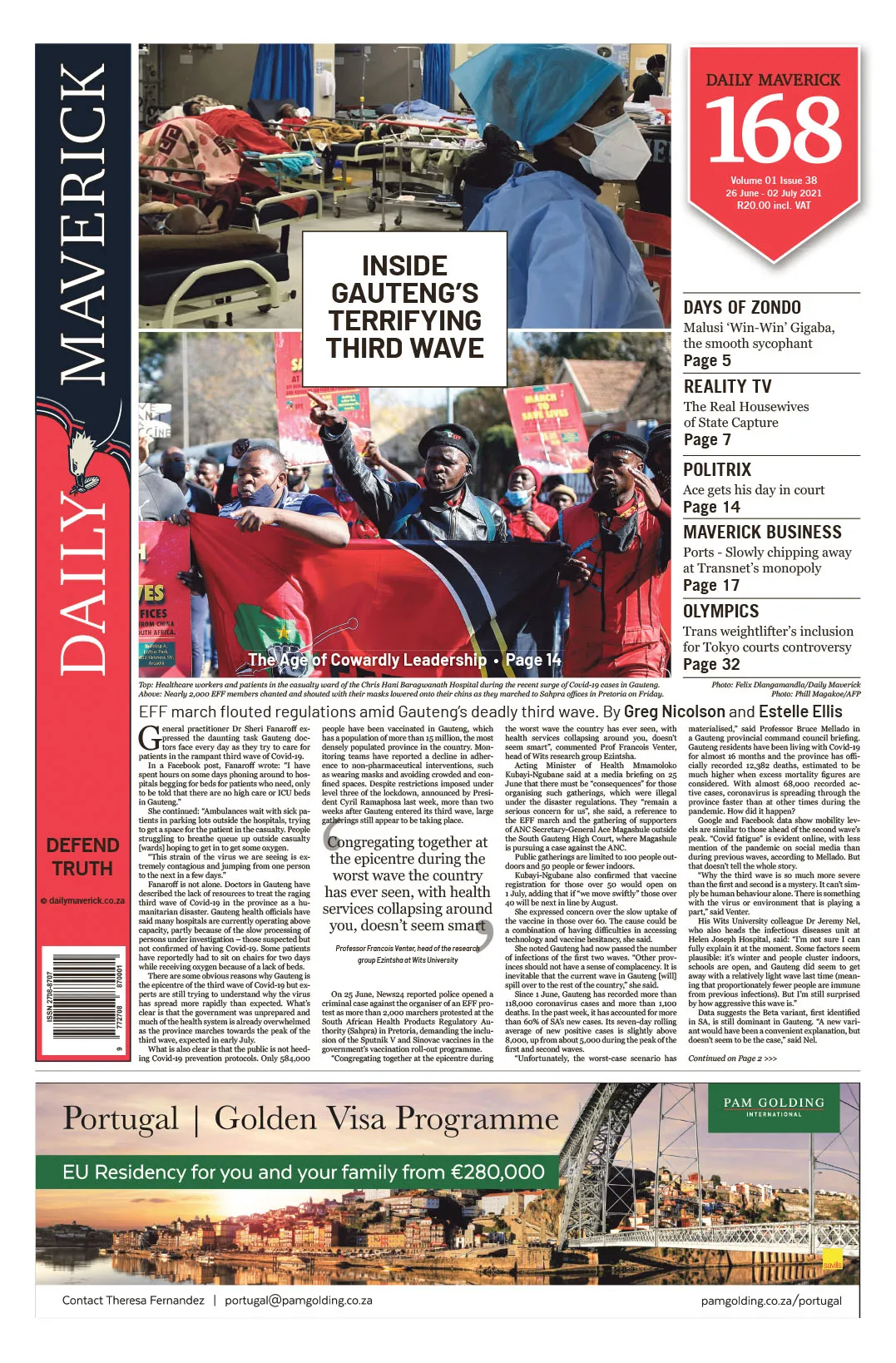DM168 CORONAVIRUS
The epicentre of the crisis: Inside Gauteng’s raging Covid-19 third wave
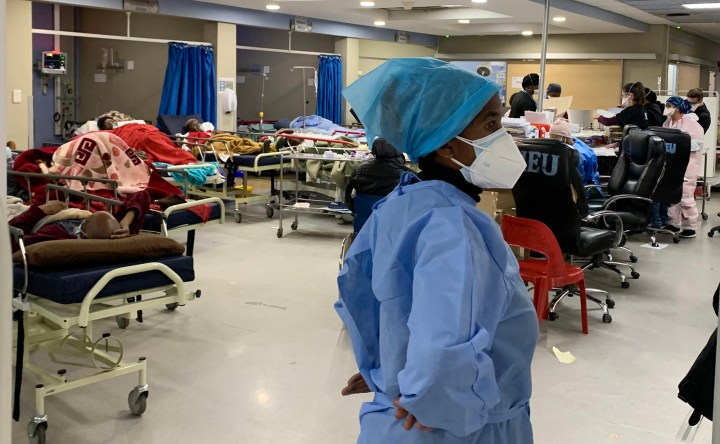
The Delta variant of the Covid-19 virus which swept through India and rapidly spread to 85 countries around the world and now dominates 95% of infections in the UK, is now the dominant variant in South Africa.
First published in the Daily Maverick 168 weekly newspaper.
This story has been updated following publication in the newspaper to take into account developments on Saturday afternoon.
General practitioner Dr Sheri Fanaroff describes the daunting task Gauteng doctors face every day as they try to care for patients in the rampant third wave of Covid-19.
In a Facebook post, Fanaroff wrote: “I have spent hours on some days phoning around to hospitals begging for beds for patients who need them, only to be told that there are no high care or ICU beds in Gauteng.”
She continued: “Ambulances wait with sick patients in parking lots outside the hospitals, trying to get a space for the patient in the casualty. People struggling to breathe queue up outside casualty [wards] hoping to get in to get some oxygen.
“This strain of the virus we are seeing is extremely contagious and jumping from one person to the next in a few days.”
On Saturday afternoon Fanaroff’s concerns of a more infectious strain of the Covid-19 virus was confirmed at a virtual media briefing called by acting Health Minister Mmamoloko Kubayi-Ngubane.
The Delta variant of the Covid-19 virus which swept through India and rapidly spread to 85 countries around the world and now dominates 95% of infections in the UK, is now the dominant variant in South Africa.
Speaking at the media briefing, Professor Tulio de Oliveira, director of genomics surveillance lab KRISP (KwaZulu-Natal Research Innovation and Sequencing Platform) said the Delta variant was found in several clinics across six districts and 30 randomly selected sites in KwaZulu-Natal and in the Garden Route.
Professor de Oliveira said KRISP had only received samples on Thursday to sequence from Gauteng but it is likely that the rapid rise in infections in the country’s most densely populated province is a result of the new variant which is from 30% to 60% more transmissible than the Beta variant which was dominant in South Africa’s second wave.
Professor Koleka Mlisana, the head of the Covid-19 Ministerial Advisory Committee (MAC) said stricter restrictions on the movement of people should be implemented urgently. She said it is not surprising that infections are soaring in Gauteng, even though there is no data yet to confirm that the Delta variant is responsible for Gauteng’s surge.
Early evidence from the UK suggests that symptoms of the Delta variant are different, said Professor de Oliveira. “Prominent symptoms currently are headaches, sore throat, runny nose and sneezing.”
Doctors like Fanaroff in Gauteng have described the lack of resources to treat the raging third wave of Covid-19 in the province as a humanitarian disaster. Gauteng health officials have said many hospitals are currently operating above capacity, partly because of the slow processing of persons under investigation – those suspected but not confirmed of having Covid-19. Some patients have reportedly had to sit on chairs for two days while receiving oxygen because of a lack of beds.
There are some obvious reasons why Gauteng is the epicentre of the third wave of Covid-19. What’s clear is that the government was unprepared and much of the health system is already overwhelmed as the province marches towards the peak of the third wave, expected in early July.
What is also clear is that the public is not heeding Covid-19 prevention protocols. Only 584,000 people have been vaccinated in Gauteng, which has a population of more than 15 million, the most densely populated province in the country. Monitoring teams have reported a decline in adherence to non-pharmaceutical interventions, such as wearing masks and avoiding crowded and confined spaces. Despite restrictions imposed under level three of the lockdown, announced by President Cyril Ramaphosa last week, more than two weeks after Gauteng entered its third wave, large gatherings still appear to be taking place. Ramaphosa is expected to address the nation again on Sunday night.
On Friday (25 June) News24 reported police opened a criminal case against the organiser of an EFF protest as approximately 2,000 marchers protested at the South African Health Products Regulatory Authority (Sahpra) in Pretoria, demanding the inclusion of the Sputnik V and Sinovac vaccines in the government’s vaccination roll-out programme.
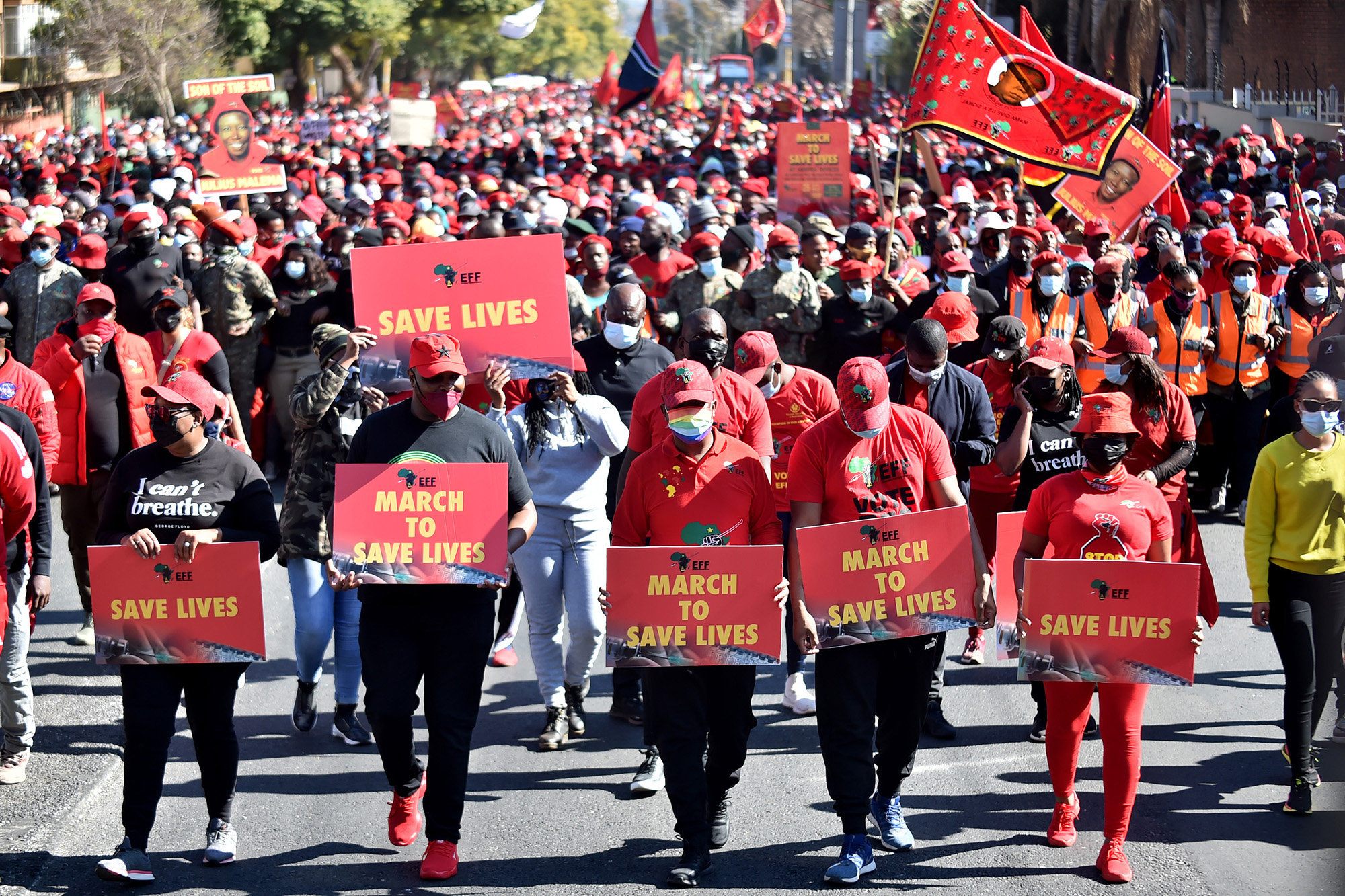
Members of the EFF march to the offices of the South African Health Products Regulatory Authority (Sahpra) to demand that the organisation speed up the approval of Russia’s Sputnik vaccine in Pretoria, on Friday 25 June, 2021. Photo: Supplied
“Congregating together at the epicentre during the worst wave the country has ever seen, with health services collapsing around you, doesn’t seem smart,” commented Professor Francois Venter, head of Wits research group Ezintsha.
Acting Minister of Health Mmamoloko Kubayi-Ngubane passionately called on all political leaders to reduce mass gatherings at Saturday’s media briefing. She said there must be “consequences” for those organising such gatherings, which were illegal under the disaster regulations.
Public gatherings are limited to 100 people outdoors and 50 people or fewer indoors.
Kubayi-Ngubane also confirmed that vaccine registration for those over 50 would open on 1 July, adding that if “we move swiftly” those over 40 will be next in line by August.
She expressed concern over the slow uptake of the vaccine in those over 60. The cause could be a combination of having difficulties in accessing technology and vaccine hesitancy, she said.
The good news from Professor de Oliveira is that vaccine data from the UK suggests that two doses of Astra Zeneca and the Pfizer vaccines provided good protection against Delta variant symptomatic disease and very high levels of protection against hospitalisation.
Gauteng has now passed the number of infections of the first two waves. Since 1 June, Gauteng has recorded more than 118,000 coronavirus cases and more than 1,100 deaths. In the past week, it has accounted for more than 60% of SA’s new cases. Its seven-day rolling average of new positive cases is slightly above 8,000, up from about 5,000 during the peak of the first and second waves.
“Unfortunately, the worst-case scenario has materialised,” said Professor Bruce Mellado in a Gauteng provincial command council briefing. Gauteng residents have been living with Covid-19 for almost 16 months and the province has officially recorded 12,554 deaths, estimated to be much higher when excess mortality figures are considered. With almost 78 359 recorded active cases, as of June 26, coronavirus is spreading through the province faster than at other times during the pandemic. How did it happen?
Google and Facebook data show mobility levels are similar to those ahead of the second wave’s peak. “Covid fatigue” is evident online, with less mention of the pandemic on social media than during previous waves, according to Mellado.
The second wave of the pandemic emerged in the coastal provinces before the government announced a harsher lockdown. It had a comparatively lower impact on Gauteng residents. Now the roles are reversed.
Dr Mary Kawonga, a member of the premier’s Covid-19 advisory committee, said a seroprevalence survey found that as of 9 January 2021 only 19% of Gauteng residents had antibodies against SARS-CoV-2. During the second wave in the Western Cape and KwaZulu-Natal, the daily incidence rate peaked at 45 to 47 per 100,000 people, compared with 34 per 100,000 in Gauteng.
“So, in many sub-districts [in Gauteng] a high percentage of the population remained susceptible to infection by the peak of the second wave. Further, the second wave in Gauteng was not as intense as in the coastal provinces where their second waves peaked at a much higher level than the first wave,” explained Kawonga. Professor de Oliveira cautioned that there is concern that people with prior Beta infection could be susceptible to reinfection with the Delta strain, meaning that there might not be herd immunity for those provinces which had high infection rates of the Beta variant.
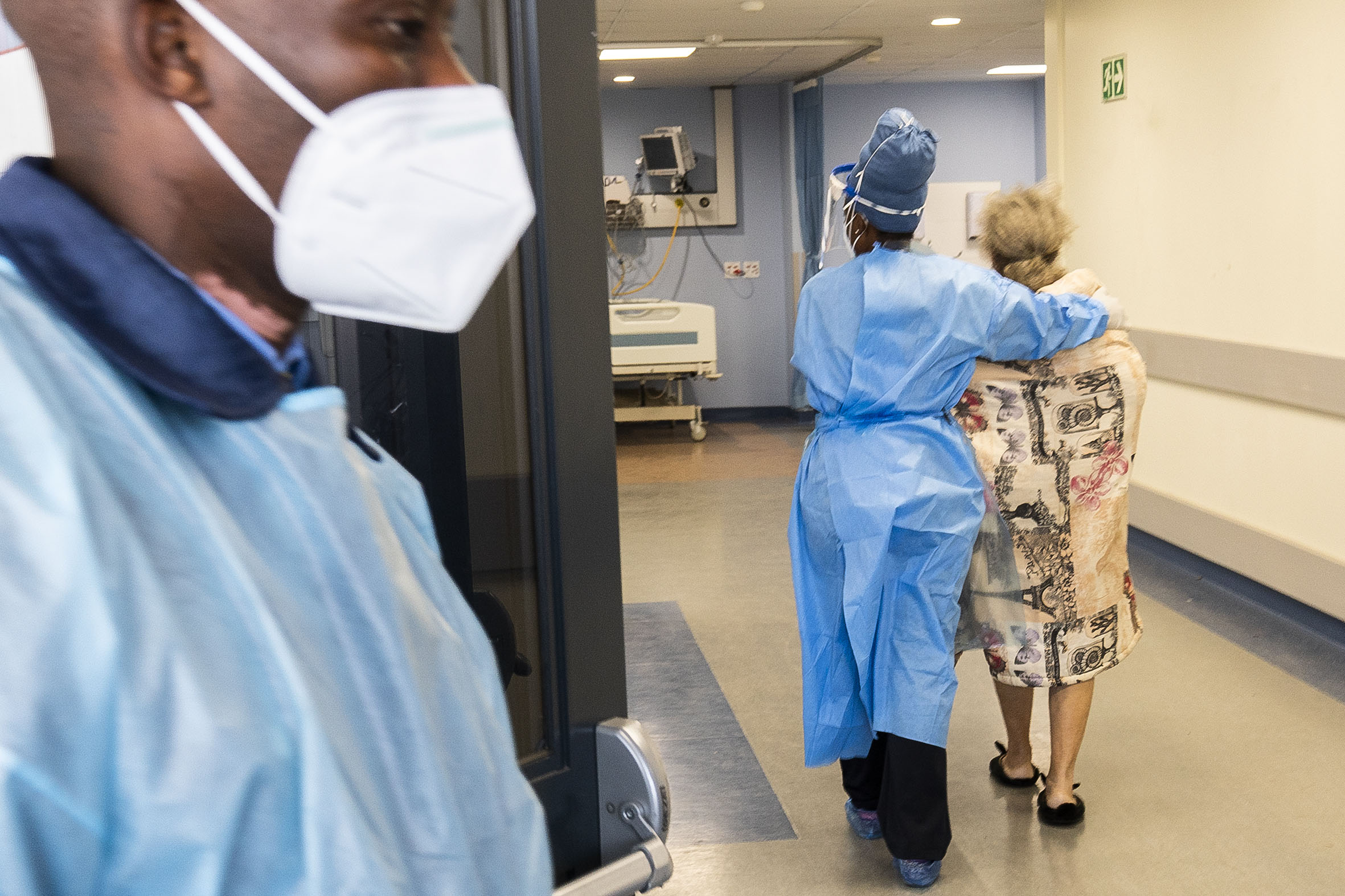
A health worker guides a patient into the Covid facility at Chris Hani Baragwanath Academic Hospital during a press conference where the SANDF has been deployed to assist as Gauteng battles to contain the third wave of Covid-19 infections. Photo / Shiraaz Mohamed
Kawonga added in addition that Gauteng is leading in testing people, having conducted 45% of the country’s tests in the week to 19 June, likely due to both increased demand and capacity. “Yes, the more testing is done, the more cases are identified,” said Kawonga.
“So, increased testing in part explains the increase in cases, but that does not account for all of it.”
Experts warned as far back as February that the Third wave in Gauteng was coming. The provincial government has been accused of ignoring the warnings, leading to a shortage of hospital beds and lack of oxygen supplies.
“Looking at these numbers, it is clear the beds are taken. The bed space is taken,” said Premier David Makhura on 24 June after Kawonga cited the latest case numbers.
Dr Jeremy Nel who heads the infectious diseases unit at Helen Joseph Hospital said doctors are splitting oxygen ports four ways just to get enough people enough oxygen. “And the shortage of beds is so acute that I know of one doctor who drove her father, who had Covid, all the way from Johannesburg to Kimberley just to get a bed in time.”
Makhura has announced that different units at Johannesburg’s Charlotte Maxeke Academic Hospital, closed in April after a fire, will reopen in stages from 28 June. The reopening is expected to progressively relieve the burden on other facilities but there’s little doubt the provincial government failed to act timeously and ensure the hospital was upgraded to meet health and safety standards and reopen ahead of the third wave.
Makhura is now reportedly considering reopening the Nasrec field hospital, which had 1,000 beds, for isolation, quarantine and “priority three” patients, after it was closed in February. But the health department has failed to manage the other field hospitals established for the precise situation in which the province now finds itself.
Nel said: “The huge third wave and the closure of Charlotte Maxeke Hospital have put a massive burden on the existing healthcare facilities. The additional Covid-specific beds, for example at the [alternative building technology facilities] near Baragwanath Hospital, or at George Mukhari Hospital, or Bronkhorstspruit Hospital, are either not functional, or functioning at only a small percentage of their total beds. The main reason for this seems to be a lack of staff, particularly nursing staff, to run them, but the facilities also suffer from a lack of consumables and other equipment.”
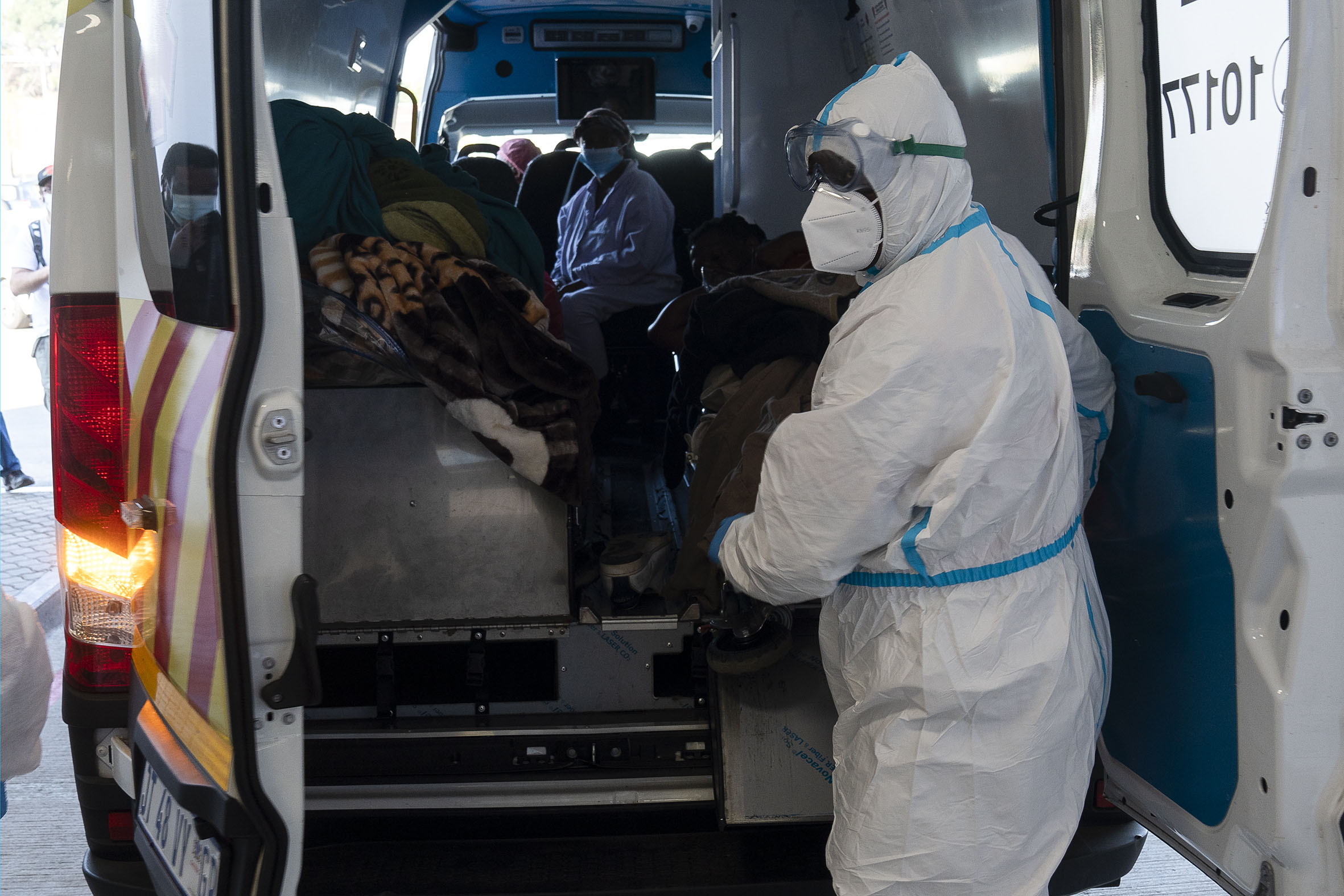
A paramedic prepares to offload a patient at the Covid facility at Chris Hani Baragwanath Academic Hospital during a press conference where the SANDF has been deployed to assist as Gauteng battles to contain the third wave of Covid-19 infections. Photo / Shiraaz Mohamed
Provincial officials have suggested they want the national government to impose a harsher lockdown in Gauteng but health experts have said more stringent regulations would have had to be imposed weeks ago to have a significant impact. Some, however, have called for further limits on gatherings and the sale of alcohol to help limit superspreader events and free up beds in trauma units.
The staged reopening of Charlotte Maxeke was welcomed by healthcare professionals, but it will probably take weeks until it can take Covid-19 patients. The provincial government has not yet clearly explained how it will staff the temporary facilities it established over the past year.
Writing in Daily Maverick this week, Professor Shabir Madhi and Professor Jonny Myers called on the province to mobilise healthcare workers from Charlotte Maxeke and other areas, including unemployed doctors and nurses, to staff the Covid-19 facilities.
Nel advised: “The most important issue is to avoid potential mass spreader events, which means refraining from mass gatherings. Beyond that, the most appropriate response to large numbers of Covid cases is not to impose ever tighter lockdown measures, but rather to ensure that sufficient hospital beds (with sufficient staff and equipment to run them) are available to avoid the healthcare system becoming overwhelmed.”
Gauteng is by far the hardest hit by this third wave, but Free State, Northern Cape and North West are also affected and other provinces could soon follow.
Speaking at Saturday’s virtual media briefing, Acting Health Minister Mamoloko Kubayi-Ngubane said Gauteng’s surge in numbers of COVID-19 infections will be replicated in other provinces as the Delta variant spreads like wildfire. DM168
This story first appeared in our weekly Daily Maverick 168 newspaper which is available for free to Pick n Pay Smart Shoppers at these Pick n Pay stores.
"Information pertaining to Covid-19, vaccines, how to control the spread of the virus and potential treatments is ever-changing. Under the South African Disaster Management Act Regulation 11(5)(c) it is prohibited to publish information through any medium with the intention to deceive people on government measures to address COVID-19. We are therefore disabling the comment section on this article in order to protect both the commenting member and ourselves from potential liability. Should you have additional information that you think we should know, please email [email protected]"

